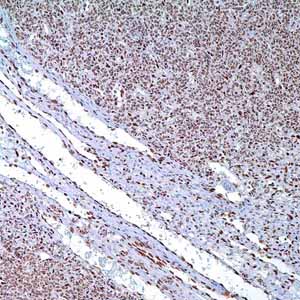
FLI-1 (MRQ-1)

Ewing sarcoma/peripheral primitive neuroectodermal tumor (ES/PNET) is a rare primary tumor of the bone/soft tissue that resembles other undifferentiated tumors. The differential diagnosis of undifferentiated tumors of the soft tissue includes blastemal Wilms tumor, rhabdoid tumor, neuroblastoma, lymphoma, clear cell sarcoma, small cell carcinoma, synovial sarcoma (SS), neuroblastoma, desmoplastic small round cell tumor (DSRCT), and ES/PNET. It is important to correctly classify these tumors for appropriate treatment. The most common primitive renal tumor, Wilms tumor, responds well to a standard regimen of multiagent chemotherapy, whereas renal ES/PNET tends to be a high-stage, aggressive neoplasm that requires more extensive therapy . The FLI-1 gene and FLI-1 protein are best known for their critical role in the pathogenesis of ES/PNET. More than 85% of ES/PNET are characterized by the translocation t(11;22)(q24;q12) that results in the fusion of the ews gene on chromosome 22 to the FLI-1 gene on chromosome 11. FLI-1 is a member of the ETS (erythroblastosis virus-associated transforming sequences) family of DNA-binding transcription factors and is involved in cellular proliferation and tumorigenesis. FLI-1 is normally expressed in endothelial cells and in hematopoietic cells, including T lymphocytes. The immunohistochemical detection of FLI-1 protein has been shown in two recent studies to be valuable in the discrimination of ES/PNET from most of its potential mimics, with the notable exception of lymphoblastic lymphoma. The FLI-1 gene has also recently been shown to play an important role in the embryologic development of blood vessels. Expression of FLI-1 protein in adult endothelial cells in all types of blood vessels (arterial, venous, and lymphatic) has previously been shown both in our previous work and in that of Nilsson et al. Folpe et al. found FLI-1 to be a highly sensitive (92%) and, with regards to the cases evaluated in this study, specific (100%) marker of both benign and malignant vascular tumors. The “absolute specificity” of FLI-1 is of course lower, given its expression in ES/PNET and lymphomas. FLI-1 expression appears to be the first reliable nuclear marker of endothelial differentiation. In particular, Folpe et al. found that FLI-1 reliably distinguished epithelioid forms of angiosarcoma from two important mimics, epithelioid sarcoma and carcinoma. Assoc. products: WT-1, CD99, Synaptophysin, Chromogranin A, CK AE1/AE3.
